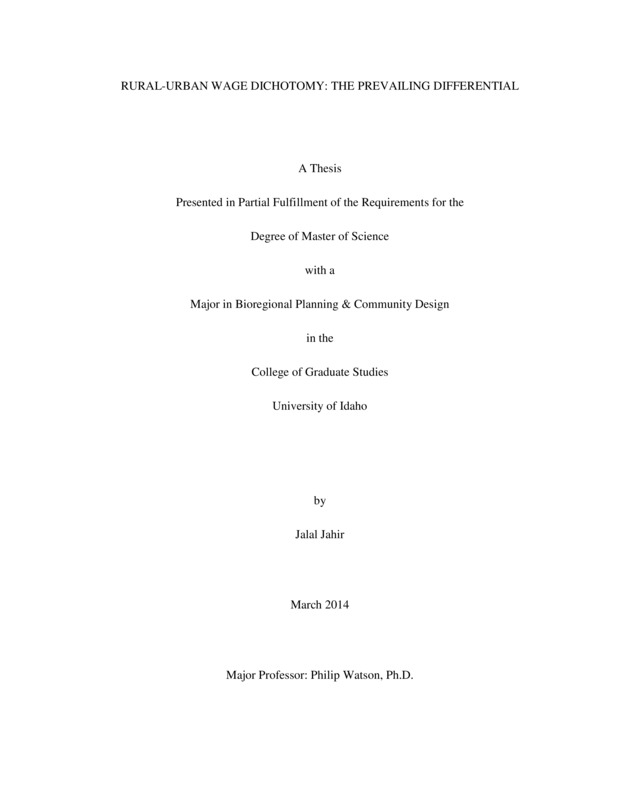RURAL-URBAN WAGE DICHOTOMY: THE PREVAILING DIFFERENTIAL
Jahir, Jalal. (2014). RURAL-URBAN WAGE DICHOTOMY: THE PREVAILING DIFFERENTIAL. Theses and Dissertations Collection, University of Idaho Library Digital Collections. https://www.lib.uidaho.edu/digital/etd/items/jahir_idaho_0089m_10177.html
- Title:
- RURAL-URBAN WAGE DICHOTOMY: THE PREVAILING DIFFERENTIAL
- Author:
- Jahir, Jalal
- Date:
- 2014
- Keywords:
- Blinder-Oaxaca decomposition economic development policy fixed effect models income inequality spatial autocorrelation wage gap
- Program:
- Bioregional Planning
- Subject Category:
- Urban planning; Economics, Labor; Geographic information science and geodesy
- Abstract:
-
The growing income inequality in the U.S. is widening the gap between rural and urban returns to labor. Most income inequality studies to date have focused either on international or inter-state wage differences. There is a continued need for improved understanding of the increasing rural urban wage differentials at a localized (i.e. county level) geography. This study identifies a method of delineating the factors contributing to the rural urban wage gap. Both Fixed Effect and Ordinary Least Square (OLS) models are utilized in defining the county wage functions for the contiguous U.S. counties. The Blinder Oaxaca decomposition method is employed to decompose the contribution of the explanatory variables of the wage models in explaining the rural urban wage differentials. The decomposition results of the county wage models suggest that physical, social, natural, economic and location attributes explain a major portion, but not all, of the rural-urban wage differentials. Controlling for industry mix variables only slightly improves the model. However, controlling for variation in human capital endowments (e.g. expected education) yields a model that explains almost all of the wage differences between urban and rural regions. The results inform that identifying and focusing on the key reasons behind the growing differences in rural-urban average returns are likely to help formulate proper policies for rural poverty alleviation.
- Description:
- masters, M.S., Bioregional Planning -- University of Idaho - College of Graduate Studies, 2014
- Major Professor:
- Watson, Philip
- Committee:
- Frazier, Tim; McIntosh, Christopher
- Defense Date:
- 2014
- Identifier:
- Jahir_idaho_0089M_10177
- Type:
- Text
- Format Original:
- Format:
- application/pdf
- Rights:
- In Copyright - Educational Use Permitted. For more information, please contact University of Idaho Library Special Collections and Archives Department at libspec@uidaho.edu.
- Standardized Rights:
- http://rightsstatements.org/vocab/InC-EDU/1.0/

